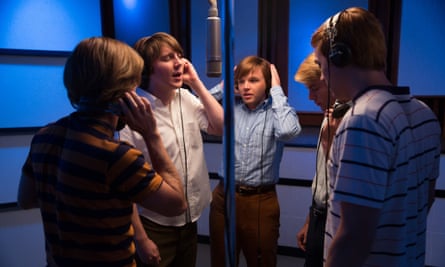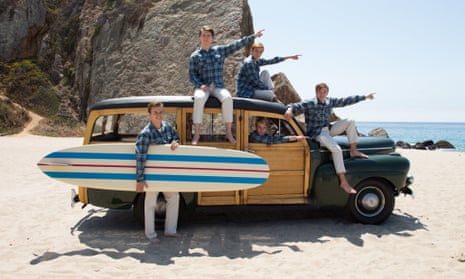Truly a Californian epic of sunshine and noir, Coppertone psychedelia and complete psychosis, the story of Brian Wilson and the Beach Boys – a sun-kissed “Come to Sunny California” ad pasted over a bottomless abyss of paternal alcoholism and violence, massive drug abuse, deepening (then all-conquering) lunacy, and one impure, highly adulterated “genius” – was unlikely, in cinematic form, to satisfy everybody. It depends on the Brian, or Brians, you bring to the table: the idiot savant with a direct line to melodic heaven? The “genius musical mind” on the chassis of “an amateur human being”? The Brian of now, looking forever like a man just off the battlefield?
Fifty years of that rollercoaster life would be a challenge on the scale of King Lear for a single actor, even without the Jake LaMotta-style dietary requirements, so Love & Mercy director Bill Pohlad wisely uses two. Paul Dano is the young Brian of the 60s, at the height of his mastery and the onset of his mental illness; John Cusack is the beaten and broken Brian of the 70s and 80s, while he was in the custody of the abusive and “controversial” psychologist Eugene Landy (Paul Giamatti), who did to Brian much what Allen Klein did to the Beatles.
The movie flashes back and forth between the awkward Brian of the Pet Sounds/Smile period and the sorrier later figure, imprisoned in his own beach house, attended by bodyguard-nurses, and browbeaten into creativity by the strategic withholding of cheeseburgers and joints. Dano is mostly excellent as the young Brian revolutionising the studio as a new instrument and, without the Beach Boys, improvising with the famed Wrecking Crew session musicians and various imported virtuosos on the backing tracks for Pet Sounds. The sense of cutting-edge creativity and invention is as palpable as it probably was down the freeway at Nasa. All the while, of course, we know that when the band return, his dickish cousin Mike Love will ask, moronically, “What is this shit, Brian?”
Love, alongside Landy, isn’t the only villain; there’s also jealous, drunken monster-dad Murry Wilson, whose sale of Brian’s song catalogue for pennies on the dollar precipitated Brian’s total mental collapse. Murry and Landy are portrayed as parallel abusive fathers, exploiting Brian financially and musically, while the other Beach Boys fade into the background, and the twin tragedies of Dennis and Carl’s early deaths go largely unmentioned (ditto Charles Manson).
The rescue of Cusack-Brian by second wife-to-be Melinda (Elizabeth Banks) feels hedged in by legal briefs from all the real-life survivors. And an ambulatory human shipwreck, his creativity all but burned away, doesn’t make for much of an emotional payoff. Despite all that, those superb, tear-jerking studio scenes will linger in my head for years.









Comments (…)
Sign in or create your Guardian account to join the discussion